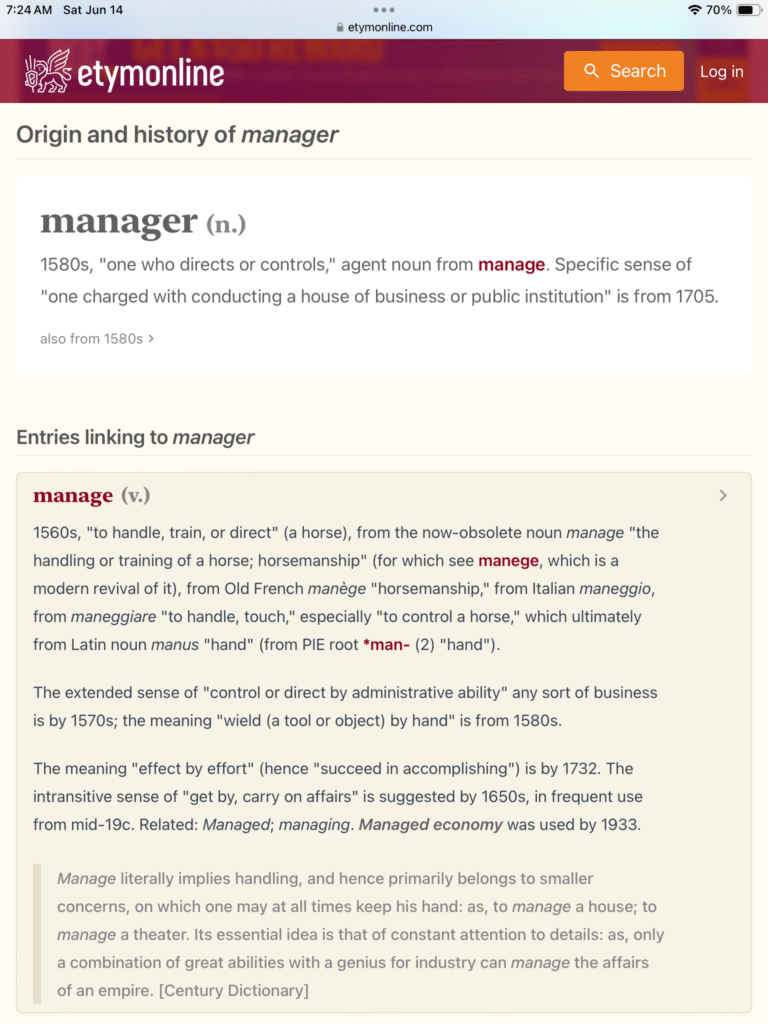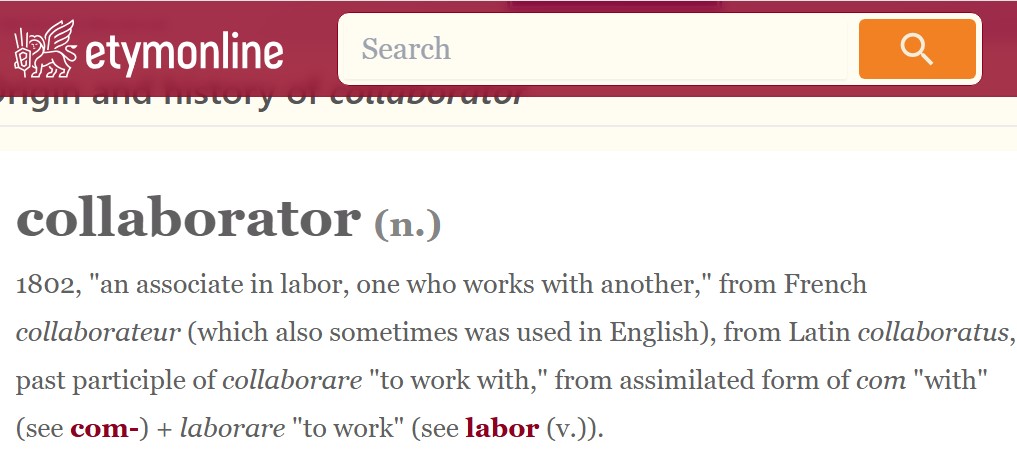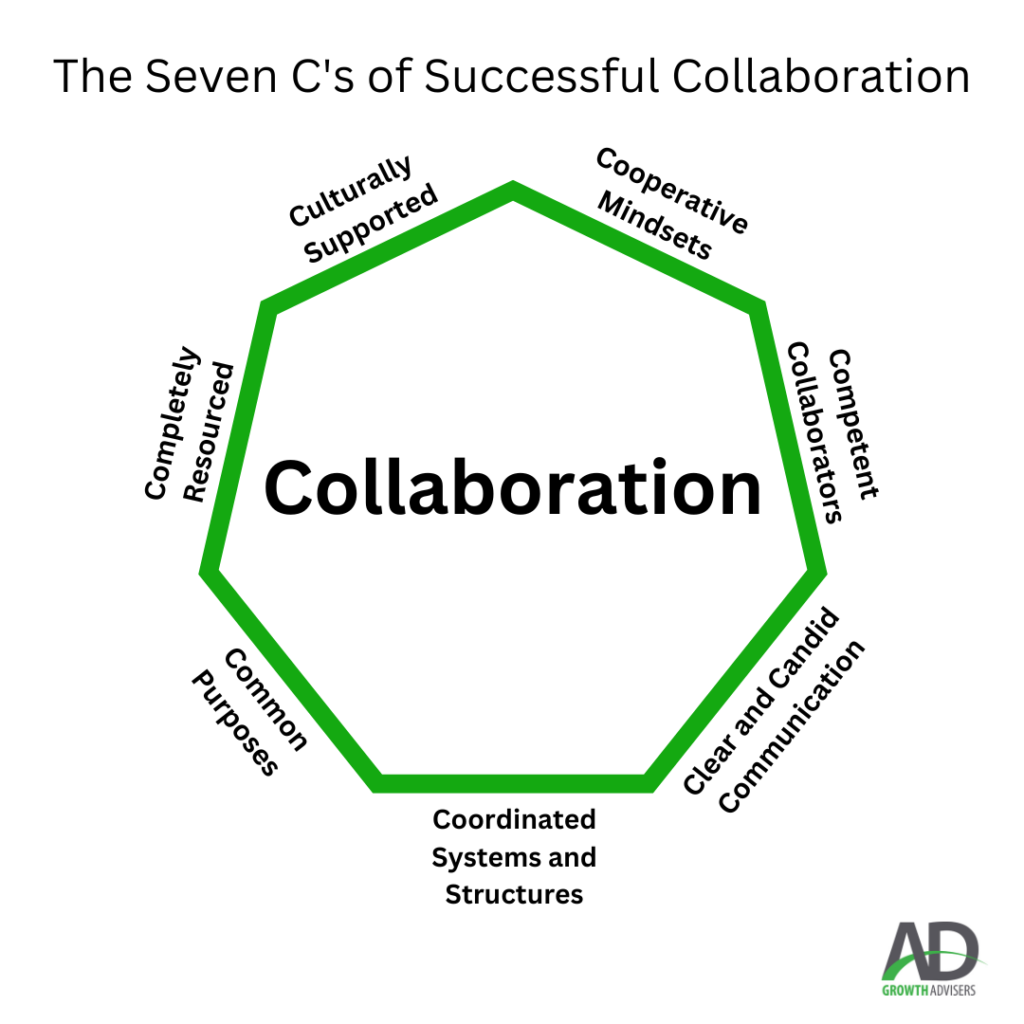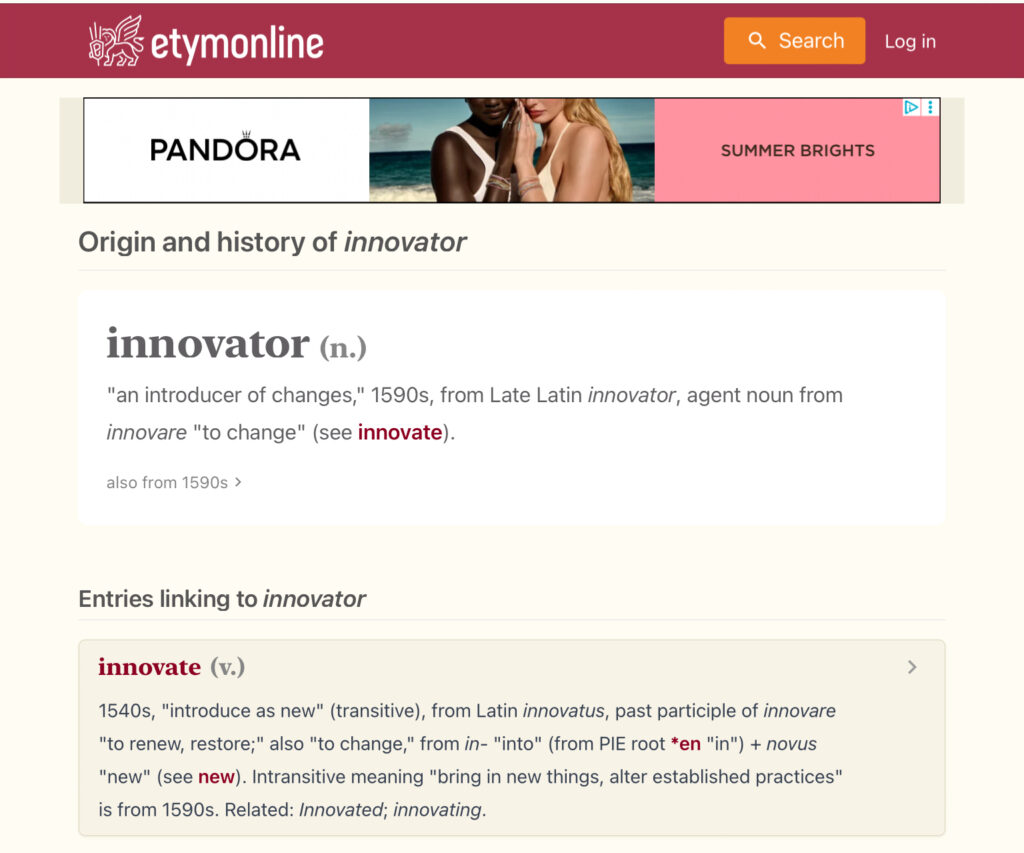What comes to mind when you think about what a leader does in business? Is leader just another word for a good manager? Does an effective, highly humane, beloved boss automatically qualify as a leader? If you imagine a current or historical great leader, what behaviors qualify them to be bestowed with the honorific title of “Great Leader”? How would you define the word leader in a business context?
I have been wrestling to adequately answer these questions and reconcile my thoughts with the constant AI-generated pro-leader propaganda and platitudes polluting my LinkedIn feed daily. I decided to try to return to the root of the issue and find meaning in this cult-like fetishism for using the word leader.
To understand each other, we must accept standard definitions of words. A word miscommunicates when it lacks a common understanding of its intended meaning. I started my research on the word leader at etymonline.com. The image below shows its historical meaning.

Newsflash: Leaders lead, march at the head of, go before as a guide, accompany, and show the way. Nowhere does the origin of the word leader refer to a manager. All LinkedIn posts comparing leaders and managers, and the goal of a leader is to make more leaders, are nonsense. We have been led astray.
What if leaders have no value in modern organizations except during a fire drill, where the leader leads others to the nearest exit and out of the building to safety?
I already feel Maxwell’s ardent servant leadership disciples looking for their pitchforks and torches to rid themselves of a heretic like me for even asking such a question. Molding heroic leaders out of mere mortals is BIG business, even if it has not led us to the promised land of improved business performance. Leaderists advise us to keep doing more of what has not worked until everyone is a leader. Once everyone is a leader, we will all enter Utopia Inc.
But Isn’t My Manager My Leader?
A dictionary would say a manager is only your leader when they know the way to the nearest fire exit and command, “Follow me!” On any typical day, your manager is managing, not leading. (I’ll pause for a moment to give you time to collect the scattered bits of your blown mind.)
So, back to eymonline.com to learn the meaning and origin of the word manager, which you can see below.

Managing is Horsemanship, Not Leadership
Managers manage, direct, and control. As a recovering former manager myself, I love that folks in the 1560s had pretty much figured out the modern manager’s challenge of needing to “handle, train, or direct a horse.” Managing is horsemanship, not leadership! Now we know why we can lead a horse to water, but cannot make them drink. Leading isn’t managing. Leadership is not good management! Modern managers still appropriately control and direct by administrative ability, just like in the 1570s.
Management and Leadership Divorce in 1991
Joseph C. Rost, Ph.D., was a little-known leadership scholar who published a little-read book in 1991 titled “Leadership For The Twenty-First Century.” In only 220 pages, Rost offered a critique of the flawed understanding of what he termed “Industrial Leadership” and redefined the word leadership to reflect a new leadership paradigm already supplanting the obsolete Industrial Leadership paradigm in the late 1980s. Rost was perhaps the first to announce the divorce of management and leadership. The two social phenomena no longer need to be mentally married as synonyms and must now go their separate ways due to their different organizational purposes.
Rost cites Stogdill’s (1974) statement about the origins of the words leader and leadership in his “Handbook of Leadership”, Bass (1981) repeated the information in his edition of the “Handbook”: “A preoccupation with leadership as opposed to headship based in inheritance, usurpation, or appointment occurs predominately in countries with an Anglo-Saxon heritage. The Oxford English Dictionary (1933) notes the appearance of the word “leader” in the English language as early as the year 1300. However, the word “leadership” did not appear until the first half of the nineteenth century in writings about political influence and control of British Parliament.” p. 7.
Rost quoted James MacGregor Burns’ 1978 book, “Leadership,” in which Burns concluded, “Leadership is one of the most observed and least understood phenomena on earth.” p.2. Burns also mused that if we know far too much about our leaders, we know very little about what leadership really is.
After an extensive review of the available leadership literature in the 1980s, Rost concluded two important things in his book. First, “The reality is that, as of 1990, scholars and practitioners do not know, with certainty, what leadership is. This uncertainty about such an essential question must end in the 1990s. There is no possibility of framing a new paradigm of leadership for the twenty-first century if scholars and practitioners cannot articulate what it is they are studying and practicing.” p.6.
“The second problem with leadership studies,” wrote Rost,” as an academic discipline and with people who do leadership is that neither the scholars nor the paractitioners have been able to define leadership with precision, accuracy, and conciseness so that people are able to label it correctly when they see it happening or when they engage in it. Without an agreed-upon definition, all kinds of activities, processes, and persons are labeled as leadership by scholars and practitioners.” p.6.
So What Is Leadership?
Rost defined the now obsolete Industrial Leadership paradigm as, “great men and women with certain preferred traits influencing followers to do what leaders wish in order to achieve group/organizational goals that reflect excellence defined as some kind of higher-level effectiveness.” p. 91
Rost’s original 1991 Postindustrial Leadership paradigm definition of leadership was augmented by Matthew Chodkowski, Ed.D., Founder of The Institute for Postindustrial Leadership, in 2025 to become:
“Leadership is an interactive influence relationship among collaborators who intend and enact real, significant changes that reflect their purposes.”
21st-century leadership is finally divorced from its common business-law marriage of leadership being good management done by leaders (great managers). Leadership is now recognized for what it actually is: a collaborative organizational change process. As Dr. Chodkowski likes to say, “Unbelievable, but true!”
Who Leads Change Efforts?
So if you have stayed with me this long, you may be wondering, “If leaders have no main organizational role and don’t do leadership to followers, management isn’t leadership, and leadership is an interactive relationship among collaborators seeking to enact significant organizational changes aligned with their mutual purposes, who leads change efforts? There is a new role that is the key to organizational adaptability. The role of collaborator. This requires another click to etymonline.com and the development of many new skills.

Interactive relationships, meaning non-coercive and multidirectional influence, are formed by collaborators (people working together) who align a significant change effort with their mutual purposes. This collaboration in action is leadership.
Collaboration is an essential skill, yet it is often lacking in organizations that still cling to the obsolete Industrial Leadership paradigm based on leader centrism and command and control. In brief, researcher Paul W. Mattessich, Ph.D., defined collaboration in his 2018 book with Kirsten M. Johnson, “Collaboration: What Makes It Work,” as: “a mutually beneficial and well-defined relationship entered into by two or more organizations to achieve common goals. The relationship includes a commitment to mutual relationship and goals; a jointly developed structure and shared responsibility; mutual authority and accountability for success; and sharing of resources and rewards.” p. 5.
While Rost and Mattessich were unaware of each other’s research, you can see the unity of their thinking. Mattessich was focused on different organizations collaborating, but in personal conversations with me, he agreed that the definition remains valid when applied at the individual organizational level as well. We replace the word organizations with people.
Developing collaboration as an organizational competency is critical to create a highly adaptable organization that can withstand the impacts of today’s increasing rate of disruptive changes. The most highly adaptable organizations are the most likely to survive, and so it is critical to adopt the Postindustrial Leadership paradigm and stop wishing for a mythical heroic savior leader to deliver us. We do not need more leaders; we need more highly competent collaborators.
While Mattessich identifies 22 keys to collaboration success, I tend to focus my consulting and organizational training efforts on the core 7Cs of Collaboration.

You can take my free Quick Collaboration Readiness Assessment or learn more about how to create collaboration as a core organizational competency here.
If We Don’t Need Leaders, Who Initiates Changes?
Leaders lead. Managers manage. Collaborators collaborate. Who initiates an organizational change process? For a long time, I have been trying to redefine the word leader to add a business usage definition, which would make the leader’s function a temporary role that could be assumed by anyone who envisions a possible organizational change and initiates persuasive dialogues to lobby and influence others, leading them to support the leader’s envisioned change. After many LinkedIn posts, a couple of blog articles, and conversations with Matthew Chodkowski, Ed.D., I have come to appreciate the futility of my efforts to save the word leader. Leader, as a word, has little value in the business context. It is too overused and misdefined. It connotes status, power, authority, management, and even godlike kingship. Everyone believing they are responsible for serving as a leader prohibits effective collaboration.
I am mentally dating the word innovator as the temporary organizational role for a person with an idea for a significant organizational change to assume. I do not know if I will become professionally married to it yet, but it certainly looks promising. Below is the result from my final visit to etymonline.com.

So What’s the Point?
As Chodkowski writes in his “Lead Foundations” program, “Management is about reducing complexity and increasing stability. Leadership is about increasing change and reducing complacency. Complexity requires management. Change requires leadership.” p. 165
“No company has the luxury of having leaders who do not manage. But: No company should tolerate managers who do not understand leadership.” p. 166. Chodkowski also writes, “Managers must develop competencies based on the traditional functions of management (planning, organizing, directing, coordinating, and controlling). Controlling means: measuring, testing, or verifying by evidence or experiments, and adjusting as needed to achieve the desired outcomes.
“Collaborators must develop consciousness based on the contemporary Postindustrial paradigm of leadership (profound principles, mutual influence, and mutual purpose.” p. 167.
“A person’s leadership paradigm informs his or her management philosophy–not the other way around. Leadership principles influence management practices.” p.167.
Internet legend has it that Albert Einstein once said, “We cannot solve our problems with the same thinking we used to create them.” Continuing to follow the leader-centric train will continue to lead us to a frustrated future destination. Adopting the Postindustrial leadership paradigm and internalizing foundational principles allows people in today’s organizations to become highly adaptable and out-change their competitors. If we understand each role’s required skills and behaviors in the change process, we can collaborate to co-create our desired futures.
See Ya Later Leader! We Cannot Afford To Follow You Anymore
Goodbye, leader. It’s been nice knowing you. Let me know if you smell smoke, and I’ll follow you out the door. Otherwise, we have to work together collaboratively to change the future before it becomes an unsuccessful present.
I apologize if I ruin your future LinkedIn scrolling pleasure, because once you change your leadership paradigm, you will see how much nonsense is pawned off as wisdom.
Please contact me if you want to explore changing your leadership paradigm so you can begin future-proofing your career and organization.
Certification of Human Creation: This post is written by its author without the assistance of artificial intelligence (AI) unless specifically noted. AD Growth Advisers Inc. is the sole copyright holder and reserves all rights to its use and prohibits the unapproved use for AI learning or content creation without prior permission from the copyright holder.
Copyright 2025, AD Growth Advisers Inc.
Views: 89